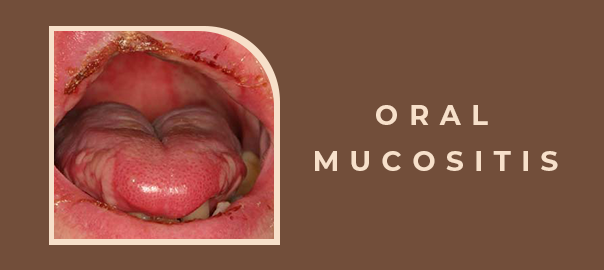
Oral Mucositis – Symptoms, Causes, Treatment
Oral mucositis is a very common, usually painful condition that generally affects the mucous membranes lining the oral cavity. Usually, this condition relates to various cancer treatments, especially chemotherapy and radiation therapy. This blog will explain symptoms, causes, and treatment options for oral mucositis.
Symptoms of Oral Mucositis
- 1. Pain and Discomfort: Pain and discomfort in the mouth due to oral mucositis are predominant. Performing even the simplest of activities like eating and drinking, even talking, is quite a task.
- 2. Redness and Swelling: There could be feelings of discomfort in the mucous membranes of the mouth and throat due to redness and swelling.
- 3. Ulcers and Sores: Ulcers and sores can appear on the tongue, gums, lining of the cheeks, or throat; these can be small or large.
- 4. Difficulty Swallowing: It may cause sores and inflammation of the mouth, making the swallowing painful.
Causes of Oral Mucositis
- 1. Cancer Treatments: Among the popular treatments of cancers, chemotherapy and radiation therapy kill not only the rapidly dividing tumor cells but also the rapidly dividing cells of oral mucosa, leading to mucositis.
- 2. Stem Cell Transplant: Those patients undergoing treatment from stem cell transplant also show oral mucositis due to the side effects of the treatment process.
- 3. Certain Medications: There are some drugs, such as certain antibiotics and also NSAIDs, which can also be a contributing factor for the development of mucositis.
Treatment Options for Oral Mucositis
- 1. Pain Management: Pain is one of the most important aspects in the treatment of oral mucositis. Dentists recommend several over-the-counter pain relievers and prescription medications.
- 2. Topical Treatments: Mouthwashes or gels containing numbing agents or other soothing ingredients can help soothe the area and heal the irritated tissue.
- 3. Oral Hygiene: Avoid worsening irritation by being gentle in oral hygiene care. This includes using a soft-bristled toothbrush, avoiding abrasive types of toothpaste.
- 4. Dietary Changes: This may include maintaining only a soft or liquid diet in order to minimize irritation upon eating. The avoidance of spicy or acidic foods can also reduce discomfort.
- 5. Underlying Cause Management: Your dentist will explain possible cancer treatment adjustments or medication-related adjustments to you.
Prevention of Oral Mucositis
- 1. Pre-treatment Oral Care: Pre-treatment good oral hygiene before the actual starting of treatments for cancer may avoid mucositis..
- 2. Regular Dental Visits: Regular dental visits for check-ups and cleaning will make and treat potential problems less serious.
- 3. Hydrating: This may prevent mucositis as proper hydration will keep the oral mucosa moist.
Conclusion:
Oral mucositis is distressing but can be managed to minimize its discomfort. It is essential that cancer patients are in close contact with their healthcare provider for symptomatic treatment and the development of strategies to prevent or manage oral mucositis effectively. You can get a checkup done at your nearby Clove Clinic. We have 450+ Clinics PAN India.
DISCLAIMER:Please note that the prices mentioned on this page: (a) present a range (depending upon the severity of the dental condition, the technology used in treatment, type of dental products used, etc.); (b) are true as on the date of this page and may change on a later date, in accordance with the standard company policy; (c) may be subject to standard aberrations or generalizations on account of the use of AI in general Google/internet search by you.Leave a Reply
Leave a Reply
Explore More Similar Posts
Explore More Blogs


Leave a Reply